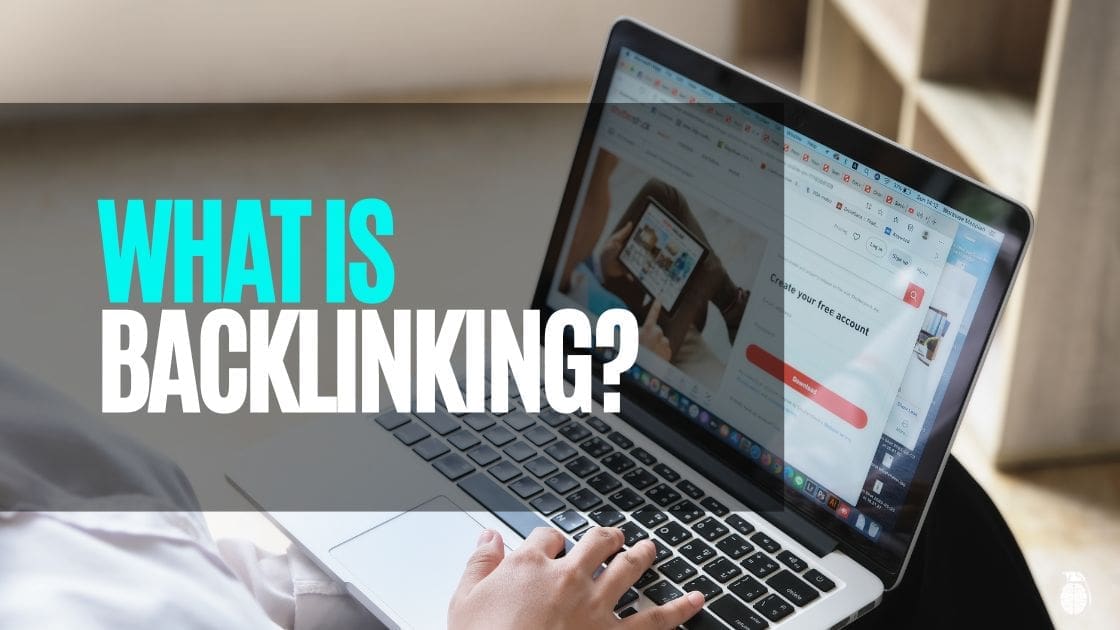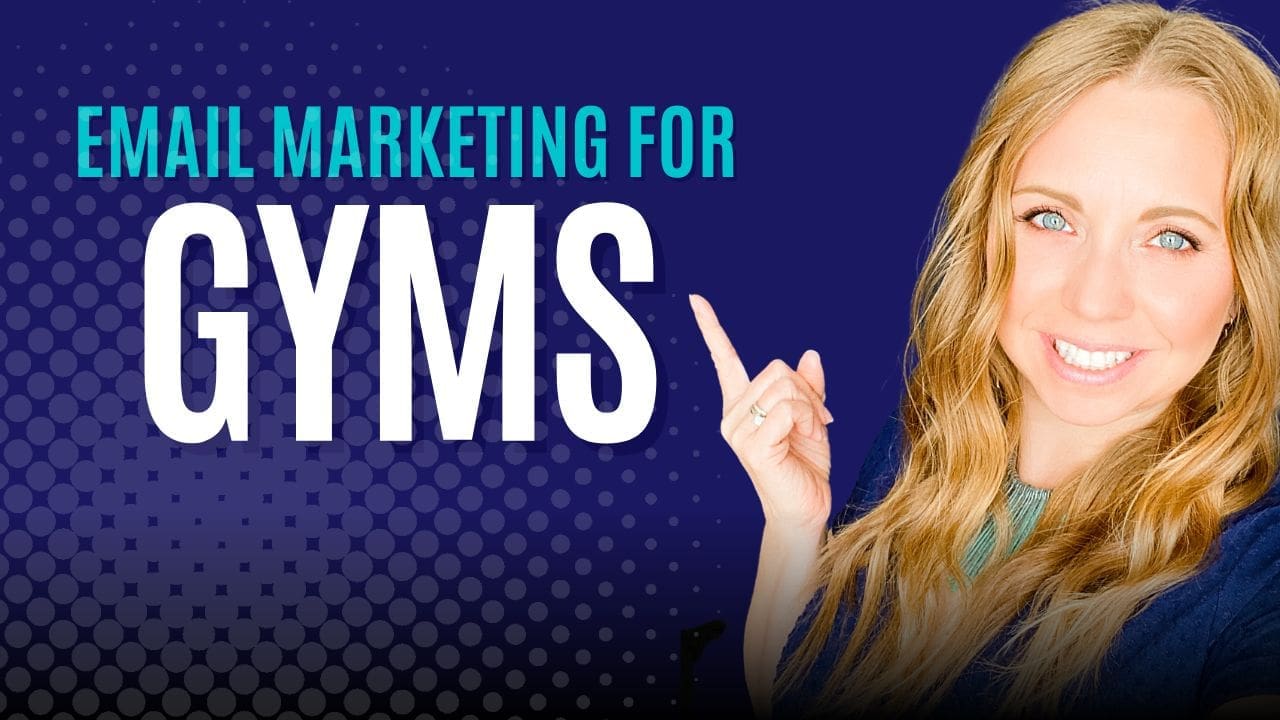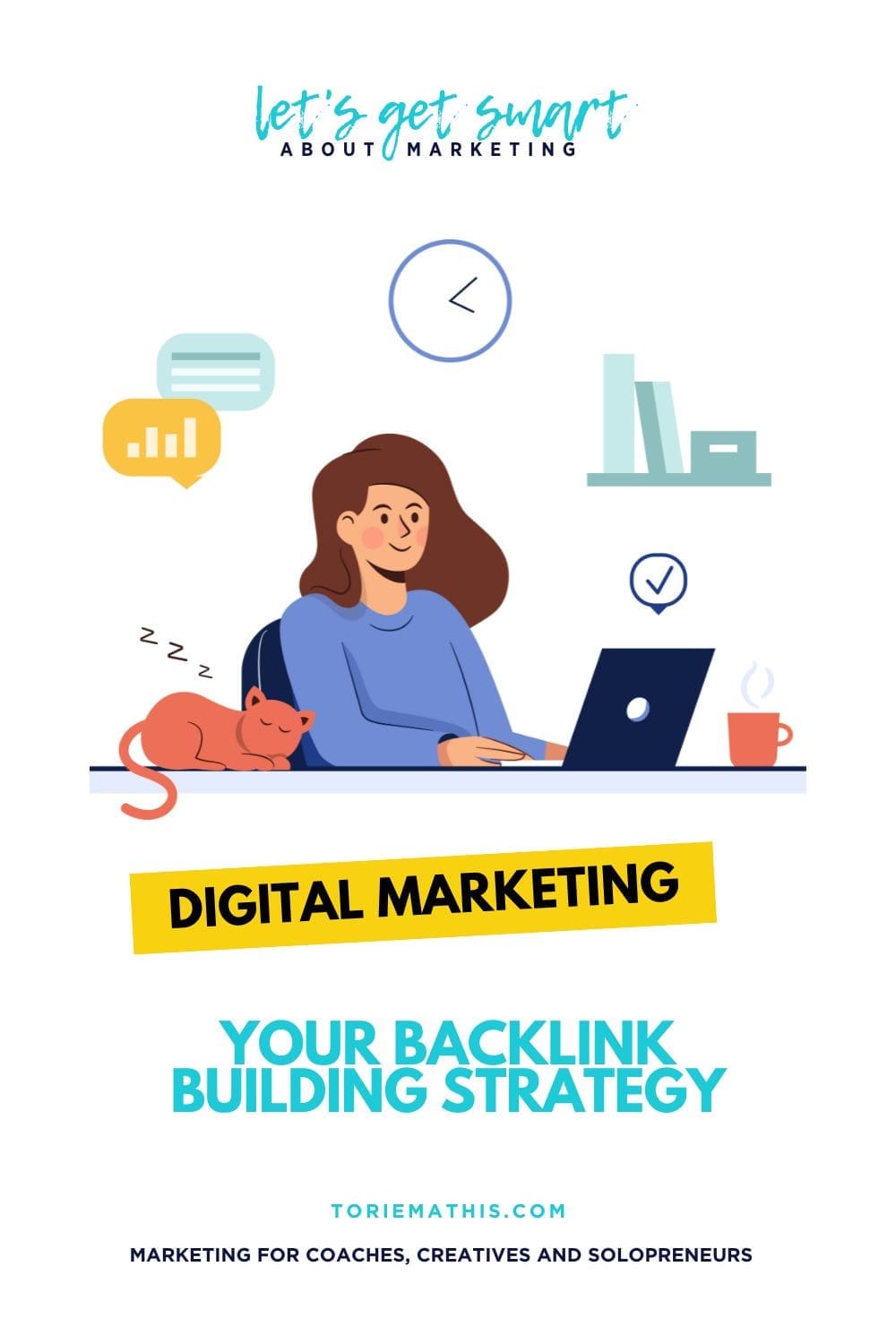What is Backlinking? Do You Need it?

What is Backlinking? Do You Need it?
Have you heard of backlinks? Maybe you heard it’s good to get them, or you were contacted by a company to do link-building for you.
(If you’ve never heard of them, or have no idea where to start you’re in the right place.)
Before you dive into link-building or hire a company for your link-building strategy let’s go over the basics of backlinking.
What is a backlink?
Basically, a backlink is just a link from one website to another. These links are important because they can help to improve the search engine rankings of your website in search engine results pages (SERPs).
Search engines and backlinks
When a website links to your website, it’s like a vote of confidence in the quality of your content. The more high-quality backlinks you have, the better your website is likely to rank in search engine results.
However, not all backlinks are created equal. Some backlinks are more valuable than others, and search engines use complex algorithms to determine the value of a backlink. So, it’s important to be selective about the backlinks you pursue and to focus on building high-quality backlinks from reputable websites.
RELATED: SEO for Beginners Series
Let’s dive into all of this and more.
What does backlinking mean?
In SEO, backlinking is the process of getting external websites to link to your own website. This is also known as “link building” and is part of your Search Engine Optimization Strategy. Backlinks are important because they can improve the ranking of your website in search engine results pages (SERPs).
When a website links to your website, it is seen as a vote of confidence in the quality of your content. The more high-quality backlinks a website has, the more likely it is to rank well in search engine results.
However, it’s important to note that not all backlinks are equal. Some backlinks are more valuable than others, and search engines use complex algorithms to determine the value of a backlink.
Why are Backlinks Important?
You may be wondering, why are backlinks important.
Google says that backlinks are one of its top three ranking factors. But why?
Backlinks are important for SEO because they help to improve the credibility and authority of your website.
When other reputable websites link to your website, it tells search engines that your content is valuable and worth showing to users.
As a result, your website is more likely to rank well in search engine results pages (SERPs). Additionally, backlinks can help to increase the visibility of your website, as they provide a way for people to discover your content through other sources. This can lead to increased traffic and potentially more customers or clients for your business.
But you’ve got to be careful in your link-building efforts as not all link-building is good.
What is the difference between good and bad backlinks?
Keep in mind that not all links are created equally. It is better to have fewer high-quality links as opposed to a great deal of poor-quality links.
But what makes a good or bad link?
A high-quality backlink is one that comes from a reputable and authoritative website that has content relevant to your own website’s content. These types of backlinks can help to improve the credibility and authority of your website, which can in turn improve its ranking in search engine results pages (SERPs).
A bad, low-quality backlink is one that comes from a low-quality or spammy website or one that is not relevant to your own website’s content. For example, if your site is on urban gardening and you received a backlink from a website selling dog food, it would not be a good link for your site.
These types of spammy or irrelevant backlinks can harm the ranking of your website, as they may be seen as an attempt to manipulate the search algorithms.
It’s important to be selective about the backlinks you go after and to avoid trying to get backlinks from low-quality websites.
Remember, it’s better to focus on building a small number of high-quality backlinks rather than a large number of low-quality ones.
Luckily, it’s easy to review your incoming links and determine if they are high or low quality.
“Focusing on quality [backlinks] over quantity is what can help to protect your site as Google updates.”
— Adam Riemer, SearchEngineJournal.com
How to check your backlinks
There are a few different ways to check the backlinks for your website:
1. Use SEO Tools to check backlinks
Use a tool like Ahrefs, SEMrush, or Moz. These tools allow you to see a list of the backlinks pointing to your website, as well as information about the quality and relevance of those links.
2. Use Google Search Console to check backlinks
Google Search Console a free tool provided by Google that allows you to see a list of the backlinks pointing to your website.
Get started with Google Search Console
3. Use Google to check backlinks
To see a list of the backlinks pointing to your website, you can enter “link:www.yourwebsite.com” into Google. This will show you a list of the websites linking to your website.
4. Check the referring domains in your website analytics tool
Most website analytics tools, such as Google Analytics, will show you the websites that are sending traffic to your website. This can be a good way to see which websites are linking to your content.
It’s important to regularly check your backlinks to ensure that they are of high quality and are not harming the ranking of your website in search engine results. This should be part of your SEO strategy.
What to do with bad backlinks
If you get bad backlinks, don’t worry, it happens. There are a few steps you can take to get rid of the bad links.
Identify the bad backlinks
You can use SEO tools like Ahrefs, SEMrush, or Moz to see a list of the backlinks pointing to your website, and look for any low-quality or spammy links. Each software will rate the quality of the incoming links.
Disavow the bad backlinks
If you find toxic backlinks that you can’t remove, you can use the Disavow Links tool in Google Search Console to tell Google to ignore those links. This can help to prevent those links from harming your website’s ranking in search engine results.
Reach out to the site owner
If you find a bad backlink on a website that you have a relationship with, consider reaching out to the site owner and asking them to remove the link.
Monitor your backlinks regularly
To prevent bad backlinks from accumulating, it’s important to regularly monitor the backlinks pointing to your website and take action as needed.
It’s also a good idea to focus on building high-quality backlinks, as this can help to offset any negative effects of bad backlinks. You’re essentially drowning out the bad ones.
Let’s dive into how to create a strategy to build good, high-quality backlinks.
Your Link Building Strategy
Here are 10 ways for you to get good backlinks for your website.
1. Create high-quality content that people want to link to
If you create awesome content, people will naturally want to share it and link to it. Think about the type of content your target audience would want to share or link to. What blog posts can you write? Here are some actions steps and tools to get you started creating high-quality content.
- Action steps:
- Identify the needs and interests of your target audience
- Research and plan your content
- Write and publish high-quality content
- Promote your content through social media and other channels
- Tools:
- Google Analytics: to understand the needs and interests of your target audience
- Keyword research tools: to identify relevant keywords and topics for your content (try SEM Rush)
- Your Website: to publish and manage your content
- Social media management tools: to promote your content through social media (try Zoho Social)
“Sadly, much of the content being published is simply not worth linking to. 75% of it is getting zero inbound links. So forget the ‘more is better’ approach to content if you want links. Go with quality instead. Your content will generate links only if it is truly exceptional—’remarkable,’ as Seth Godin would say.”
— Brian Sutter, Forbes.com
2. Promote your content
If you want people to see your content, you have to put it out there. Share it on social media, send it to influencers, and post it on relevant forums or blogs.
- Action steps:
- Identify the social media channels and other websites that your target audience uses
- Share your content on those channels and websites
- Engage with your followers and other users
- Tools:
- Social media management tools: to schedule and publish content on social media channels (try Zoho Social)
- Email marketing tools: to send newsletters or promotional emails to your subscribers (try Kartra or Constant Contact)
- Influencer outreach tools: to identify and contact influencers in your industry
3. Guest post for other websites
Writing a guest post for other websites can be a great way to get your name out there and get some exposure. Just make sure the website you’re writing for is reputable and relevant to your own content.
- Action steps:
- Identify websites in your industry that accept guest posts
- Research and pitch article ideas to the website owner or editor
- Write and publish high-quality unique guest posts
- Tools:
- Google: to search for websites that accept guest posts in your industry
- Email marketing tools: to send guest post pitches to website owners or editors (try Kartra or Constant Contact)
4. Participate in online communities related to your industry
Get involved in online communities related to your industry. You can meet other people in your field and share your content with them, which could lead to some backlinks.
- Action steps:
- Identify online communities or forums related to your industry
- Join those communities and become an active member
- Share your content and expertise with other members
Tools:
- Google: to search for online communities or forums in your industry
- Social media management tools: to join and participate in social media groups related to your industry (try Zoho Social)
5. Offer to write testimonials for other websites
If you’ve used a product or service and you really liked it, consider offering to write a testimonial for the company’s website. Most companies will be happy to link back to your website as a thank you.
- Action steps:
- Identify websites that you have used products or services from and were satisfied with
- Contact the website owner or customer support and offer to write a testimonial
- Write and publish the testimonial on the website, including a link back to your own website
- Tools:
- Email marketing tools: to contact website owners or customer support (we like Kartra or Constant Contact)
6. Create a resource page
If you have a resource page on your website, consider linking to other relevant websites. This can be a great way to build relationships and get some backlinks in return. You can make a free resource page with tools, articles, or any other group of like items like this one.
- Action steps:
- Identify relevant websites or resources in your industry
- Create a resource page on your own website and link to those websites or resources
- Reach out to the website owners and let them know you have linked to their website
- Tools:
- Google: to search for relevant websites or resources in your industry
- Your Website: to create and manage your resource page
- Email marketing tools: to contact website owners and let them know you have linked to their website (we like Kartra or Constant Contact)
7. Partner with other websites or businesses to create joint ventures
Partnering with other websites or businesses can be a win-win situation. You can promote each other’s content and get some backlinks in the process.
- Action steps:
- Identify websites or businesses that have complementary products or services
- Contact the website owner or business owner and propose a joint venture
- Plan and execute the joint venture, including promoting each other’s content and linking to each other’s websites
- Tools:
- Google: to search for websites or businesses with complementary products or services
- Email marketing tools: to contact website owners or business owners and propose a joint venture (try Kartra or Constant Contact)
- Project management tools: to plan and execute the joint venture (we like the free version of Asana)
8. Create infographics and other visual content that can be shared on other websites
Infographics and other visual content are often shared on social media and other websites. If you create something really cool, people will want to share it and you might get some backlinks as a result.
- Action steps:
- Identify relevant topics or data to visualize in an infographic or other visual content
- Research and plan the content
- Create the infographic or visual content using a design tool
- Share the content on social media and other websites, and reach out to website owners to ask them to share or link to your content
- Tools:
- Design tools: to create infographics and other visual content (e.g. Canva, Adobe Creative Suite)
- Social media management tools: to share the content on social media (like Zoho Social)
- Email marketing tools: to contact website owners and ask them to share or link to your content (we like Kartra or Constant Contact)
9. Submit your website to web directories and online directories related to your industry
Submitting your website to web directories and online directories can help to increase your visibility online. Just make sure you’re only submitting to reputable directories. A good place to start is local and industry sites, like your Chamber of Commerce, review sites like Yelp, and Industry sites like Automotive Museum Guide).
- Action steps:
- Identify web directories and online directories relevant to your industry
- Submit your website to those directories, including a description and relevant keywords
- Tools:
- Google: to search for web directories and online directories in your industry
- Website submission tools: to submit your website to multiple directories at once
10. Participate in industry events and speak at conferences, and include a link to your website in your presentation materials
Attending industry events and speaking at conferences can be a great way to build your credibility and get some exposure. Make sure to include a link to your website in your presentation materials.
- Action steps:
- Identify industry events and conferences in your field
- Submit proposals to speak at those events or conferences
- Attend the events and speak, and include a link to your website in your presentation materials
- Tools:
- Google: to search for industry events and conferences
- Email Marketing Tools: to submit proposals to speak at events or conferences (we like Kartra or Constant Contact)
Remember, the key to getting good backlinks is to focus on creating high-quality content and building relationships with other websites and businesses in your industry.
Here are some best practices for link building:
Focus on creating high-quality content. This is the foundation of any successful link-building campaign.
Build relationships with other websites and businesses. This can be through guest posts, partnerships, or simply by providing valuable content that others want to link to.
Use anchor text appropriately. Anchor text is the clickable text in a hyperlink. It’s important to use descriptive and relevant anchor text, as this can help to improve the ranking of your website in search engine results. Choose keyword rich anchor text whenever you can.
Avoid participating in link schemes. A link scheme is designed to manipulate search algorithms and is generally considered a violation of search engine guidelines. You also want to avoid any link exchanges.
Diversify your link sources. It’s important to have a mix of different types of backlinks from a variety of sources, as this can help to improve the credibility and domain authority of your website.
Monitor your backlinks. Use a tool like Google Search Console to keep track of the backlinks pointing to your website. This can help you identify any low-quality or spammy links that may be harmful to your website’s ranking.
Be patient. Link building is a long-term strategy, and it can take time to see results. It’s important to be consistent and to keep creating high-quality content to attract backlinks naturally.
Link Building for Your Business
As mentioned, link building is a long-term strategy and only one part of a complete SEO Strategy for your business.
Whether you decide to hire an SEO company or want to try out link building for yourself, it’s important to remember link building is about quality, not quantity. Try creating a resource page, promote your content more, give guest posting a try, and claim all of your online assets and your place in directories. This will give you a good start to your link-building strategy.
If you need more help with your SEO strategy, check out the SEO Guide which includes free videos, resources, tutorials, and more.
About Digital Marketing Expert Torie Mathis
 Torie Mathis helps entrepreneurs, like you, use digital marketing to grow your business without wasting time, money, or your sanity. She is a best-selling author, Army veteran, speaker + trainer, and your digital marketing coach. You don't need crazy tech skills, buckets of cash, or dedicated staff to market your business. In fact, you don't even need a lot of time. What you need is to be SMART.
Torie Mathis helps entrepreneurs, like you, use digital marketing to grow your business without wasting time, money, or your sanity. She is a best-selling author, Army veteran, speaker + trainer, and your digital marketing coach. You don't need crazy tech skills, buckets of cash, or dedicated staff to market your business. In fact, you don't even need a lot of time. What you need is to be SMART.
Torie hosts SMART AF, a show for non-techy entrepreneurs looking to grow their business, with her husband Sean and is the creator of SMART AF Magazine. Learn from Torie at the Smart Arsenal and on her channel.
What do you think? Let's talk! Leave a comment.
Hi! I'm Torie!
 I help entrepreneurs (like you) use digital marketing to get more clients + make more money. And I make it easy!
I help entrepreneurs (like you) use digital marketing to get more clients + make more money. And I make it easy!
You don’t need crazy tech skills, buckets of cash, or dedicated staff to market your business. You don’t even need a lot of time.
What you need is to be SMART.
Smart Marketing For
Get Smart AF
DELIVERED TO YOUR INBOX
from your Digital Marketing Coach Torie Mathis!
Let's get SMART!
Let's Connect!

*Posts may contain affiliate links. If you use these links to purchase, I may earn a commission at no additional cost to you.


 I help entrepreneurs learn digital marketing.
I help entrepreneurs learn digital marketing.










0 Comments